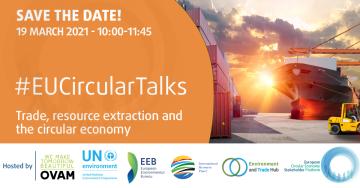
On 19 of March 2021 at 10:00-11:45, OVAM, UNEP, and the European Environmental Bureau are hosting a webinar on "Trade, Resource Extraction, and Circular Economy".
Trade in material resources – biomass, fossil fuels, metals and non-metallic minerals – has grown strongly over the past half century. In addition to rising international trade in material resources, the so-called upstream resource requirements of traded commodities have also increased. These represent the additional materials, energy, water and land used in the extraction and production of traded goods but left behind as wastes and emissions in the exporting country. This means that, when considering the whole life cycle of traded products, trade is responsible for much larger amounts of material extraction than direct trade flows indicate. Specifically, in 2017, the material requirement for trade was three times the direct trade as more than 35 billion tons of material resources were extracted globally to produce 11 billion tons of directly traded goods. In other words, more than one-third of the total 92 billion tons of material resources extracted in the global economy that year were destined to produce goods for trade.
Moreover, analysis by the International Resource Panel (IRP) of the materials embodied in trade reveals that the bulk of these resource-intensive processes have shifted from high-income importing countries to low-income exporting countries, with a corresponding shift in associated environmental burdens.
Given that the extraction and processing of resources for export has severe environmental consequences, urgent action is required to develop a more sustainable global economy. With mutually supportive policies in place, international trade frameworks can facilitate the transition towards more sustainable and circular production and consumption modes. Specifically, policy analysis by UNEP's Environment and Trade Hub shows how both multilateral trade rules and regional trade agreements can be used proactively to advance the circular economy and minimize the environmental impacts associated with resource extraction, with an emphasis on how developing countries can best position themselves.
